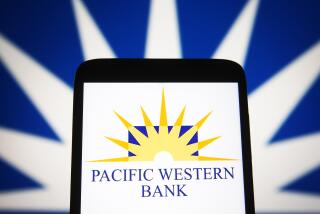THE PACIFIC TELESIS TAKEOVER : Though the Deal May Be Done, There Lingers a Question of Price
- Share via
By its own admission, Pacific Telesis Group was hot to merge with SBC Communications Inc. But did PacTel take a hard enough line in the negotiations to get its shareholders the best possible price?
That question is likely to nag PacTel investors for a long time. PacTel, while almost universally considered to be financially constrained and more in need of SBC than vice versa, nonetheless insists that it got very close to what it wanted out of SBC.
“We felt that we were realistically worth almost $40 [a share] today,” said Robert Barada, PacTel’s vice president for corporate strategy.
In the $16.7-billion stock swap deal announced Monday, PacTel said its shareholders were getting about $39 a share--about 40% more than the stock’s close of $27.75 last Friday.
But other people close to the transaction say PacTel’s initial bid demand was significantly above $40, and that it was naturally worked lower by SBC, which had its own shareholders’ stock value to consider: Because SBC is paying with stock, it was in the company’s interest to issue as few shares as possible, to avoid unduly diluting its investors.
Thus, the crucial number in the deal is the exchange ratio: SBC agreed to swap 0.733 SBC shares for each of the 428 million PacTel shares outstanding.
How, exactly, did the two come to agree on that particular exchange ratio? In any stock-swap merger, the buyer and the seller both spend a lot of time arguing that their respective stocks are undervalued in the market place.
PacTel’s Barada said his team argued that at a price in the upper-$20s in recent weeks, PacTel stock overstated investors’ fears and understated the company’s long-term potential, especially compared with other Baby Bell companies.
Concern that PacTel was certain to cut its $2.18-a-share annual dividend because of its limited near-term earnings growth potential was only one factor weighing on the stock, PacTel told SBC. Barada said his team also insisted that the market was giving PacTel no premium for California’s recovering economy, or for the company’s recently improved relations with state regulators.
SBC was persuaded on those counts. “We thought the market’s [perceptions of PacTel] were incorrect” on the economy and the regulatory outlook, said Michael Price of investment banking firm Lazard Freres, which advised SBC on the deal. (PacTel was advised by Salomon Bros.)
Both parties also measured each other with the usual valuation yardsticks: current and future cash flow, and stock value relative to underlying asset value. However, one usual merger yardstick--the recent sale prices of other phone companies--didn’t figure in the negotiations because the sheer size of the deal put it in a class by itself.
For its part, PacTel studied the political risk in SBC’s stock, given that the company owns 10% of Mexican phone monopoly TelMex, Barada said.
*
While PacTel made a case for a deal price north of $40, “They [SBC] of course took the position that they were undervalued as well,” Barada said--with the idea being that PacTel should accept a lower exchange ratio, because SBC stock was bound to rise in value and reward PacTel holders with a higher deal price in that way.
In the wake of the federal telecommunications reform bill passed by Congress earlier this year, SBC believed that its stock, and those of other Baby Bells, did not reflect the companies’ competitive prowess in the new environment, especially compared with long-distance competitors such as AT&T; Corp. and MCI Communications, Barada said. “SBC argued that AT&T; and MCI [had succeeded] in their PR campaigns to convince investors that deregulation benefited them more,” while SBC felt that in fact the Baby Bells were bigger beneficiaries, Barada said.
In the space of a few weeks, the companies narrowed their differences and an exchange ratio of about 0.73 emerged, Barada said--a number he said was negotiated directly by the two chief executives, Philip Quigley of PacTel and Edward Whitacre Jr. of SBC.
But wouldn’t Whitacre naturally have had the upper hand, knowing that Quigley had talked merger with other phone giants, including GTE Corp. and Bell South, only to find that the others weren’t interested enough to pursue PacTel?
Barada insists that PacTel ultimately wasn’t negotiating from a weak position, because it had never gotten very far in talking with the other phone companies. Conversations between Quigley and the other firms’ CEOs were never more than “conceptual,” Barada said. The talks “were not serious.”
One Wall Street source insists that SBC knew it couldn’t low-ball PacTel on the final bid, because “there is no way they [SBC] could have forced PacTel to do this deal. PacTel clearly had the option to walk away.” Despite the likelihood that an independent PacTel would have to cut its dividend while waiting for a payoff from its heavy investment in new communications technologies, the company was hardly a bankrupt.
Should PacTel holders be happy with the final price? Although the companies officially said the deal is worth about $39 a share to PacTel--basing that on the average level of SBC shares last week--at Tuesday’s SBC closing price of $50.25 the deal’s value is $36.83 per PacTel share. That is 33% above last Friday’s PacTel price, but not much above the stock’s recent peak of $35.25.
Still, the final value will depend on SBC’s price when the deal is consummated, near year’s end. The good news for PacTel holders is that Wall Street seems quite warm to the transaction: After falling $2.75 Monday in the typical reaction of an acquirer’s stock on the day a deal is announced, SBC shares added 37.5 cents to $50.25 Tuesday. PacTel rose 37.5 cents to $34.125 Tuesday after soaring $6 Monday.
Many PacTel holders may just be happy to have been rescued from a stock that was looking like dead money for at least the next two years. Looking back over the past 12 years, however--since the Bell System breakup--PacTel hasn’t been the complete dog stock that is popularly assumed. Through last Friday, its long-term price appreciation was in same range as BellAtlantic’s and NYNEX’s, and with this week’s surge it looks better than those rivals. And adding in dividends earned since 1984, Bloomberg Business News data shows PacTel has been a far better investment than the Standard & Poor’s 500 stock index.
But as one investment banker noted, “In this business, it’s ‘What have you done for me lately?’ ”
(BEGIN TEXT OF INFOBOX / INFOGRAPHIC)
Tracking the Bells
From Jan. 31, 1984--just after the Bell System breakup--to Friday, here’s how the seven Baby Bell stocks performed, measuring share price appreciation and total return (including dividends).
*--*
Jan. 31, 1984 to last Friday: Price Total Stock appreciation return Ameritech +364% +820% Bell South +241 +556 BellAtlantic +235 +556 Nynex +217 +562 Pacific Telesis +226 +563 SBC Communications +402 +795 US West +246 +604 S&P; 500 index +295 +493
*--*
Source: Bloomberg Business News






